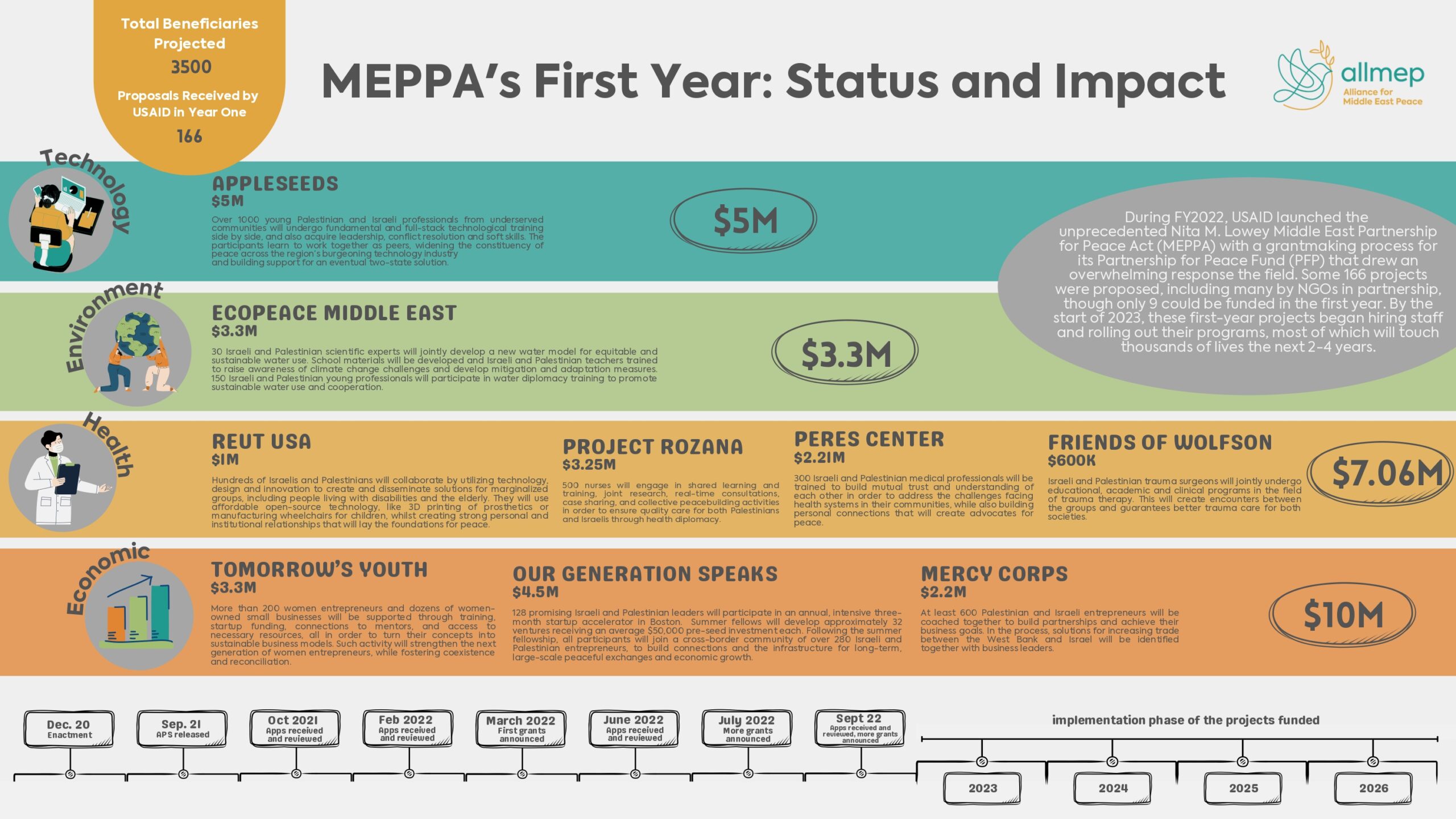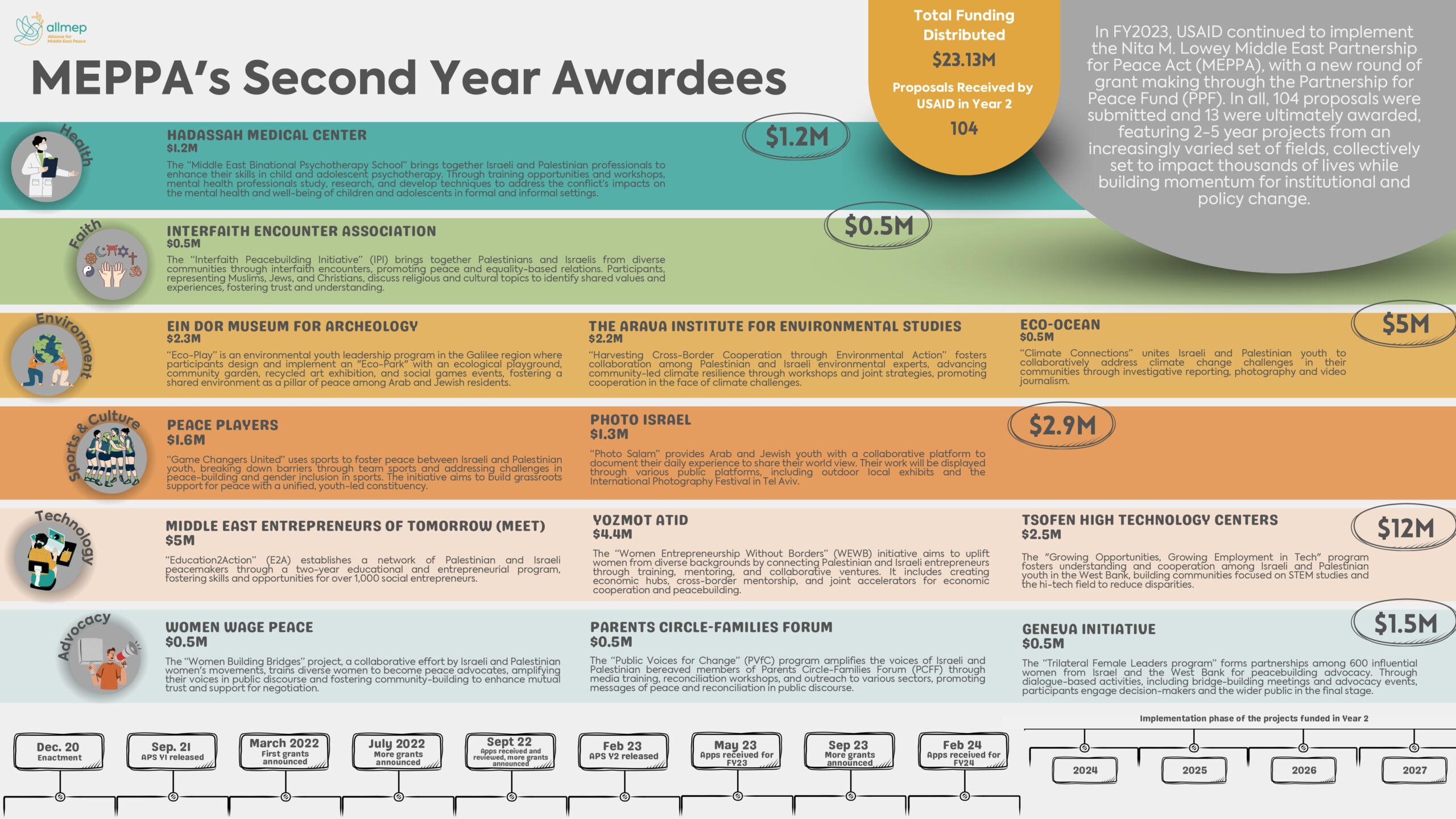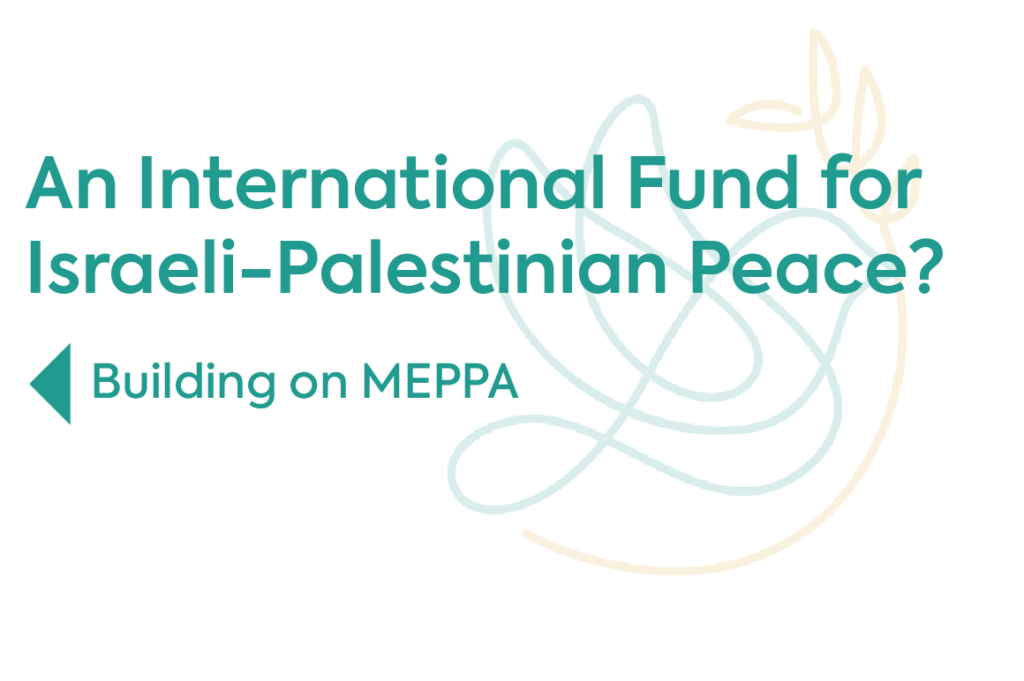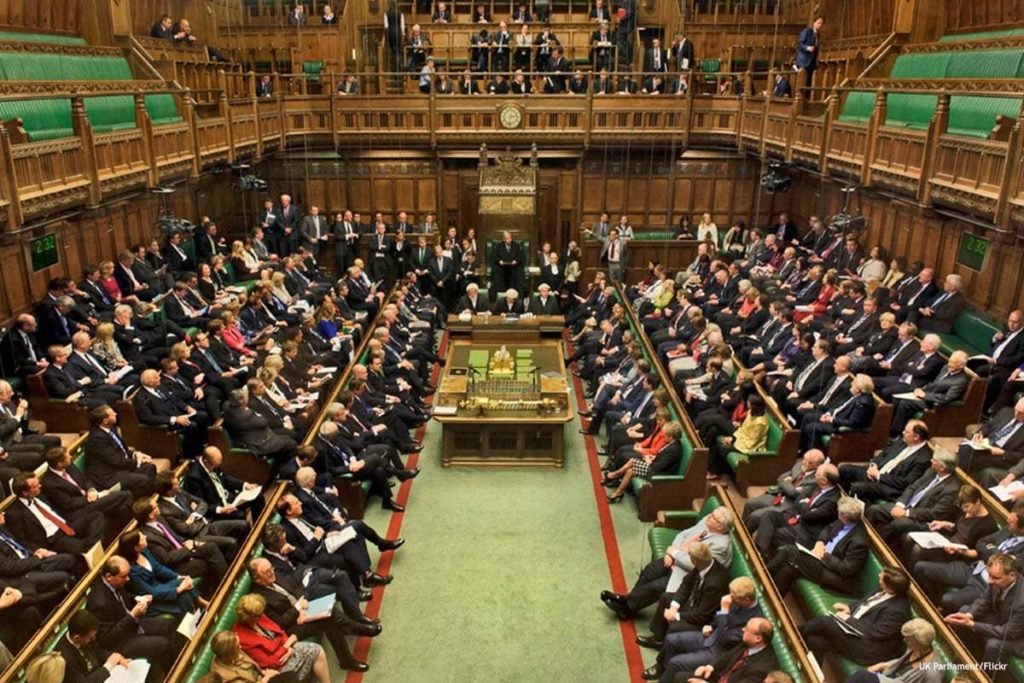Global Advocacy
The Nita M. Lowey Middle East Partnership for Peace Act (MEPPA)

The power of peacebuilding programs and economic development as conflict resolution tools is clear: less fear, hatred, and violence; increased economic growth; and greater understanding of the other, as well as a joint stake in a shared future. We know that these programs change lives, but they have never been funded at a scale where they can transform entire communities. Thanks to bold congressional leadership, the U.S. is leading to reverse these trends at scale.
MEPPA
In December 2020, after over a decade of advocacy by ALLMEP and its partners, Congress passed the Nita M. Lowey Middle East Partnership for Peace Act (MEPPA). This historic bipartisan-supported legislation committed $250 million over at least five years to support peacebuilding and Palestinian economic development. MEPPA is the largest investment ever in the region’s peacebuilders, and in the midst of this terrible trauma has begun to fund many meaningful projects that build trust and partnership between Israelis and Palestinians, tackle incitement and dehumanization, and create the conditions that peace requires.
MEPPA was passed during a period of diplomatic inertia and relative calm in the region. It is clear that this transformed reality on the ground– as well as the renewed diplomatic prioritization for conflict resolution– demands that MEPPA’s scale be significantly and urgently increased to address the needs and threats of this moment, as well as the opportunities that will emerge after a ceasefire is reached.
MEPPA Awards through the years
MEPPA Year #1

MEPPA Year #2

What is MEPPA or the Lowey Fund?
In December 2020, over a decade of ALLMEP advocacy led to the passage into law of the Nita M. Lowey Middle East Partnership for Peace Act (MEPPA). This new fund will deliver $250 million over at least five years to projects that support peacebuilding and Palestinian economic development and partnerships. It represents the largest investment ever in the region’s peacebuilders. The legislation grew out of ALLMEP’s 12-year campaign to establish an International Fund for Israeli-Palestinian Peace, which continues to gain momentum among other governments interested in leveraging this game-changing U.S. investment.
Until now, most strategies toward peace have focused on diplomats negotiating a final solution and failed to engage with peacebuilders working on the conflict at a people-to-people level every day. The Lowey Fund recognizes that sustainable and lasting peace must be built from the ground up to create a broad base of support. The fund is being administered through two different U.S. agencies: USAID for people-to-people programs and the U.S. International Development Finance Corporation (DFC) for economic projects.
ALLMEP will continue to advocate for this fund and its implementation over the next five years. It is important to clarify: ALLMEP has absolutely no role whatsoever in the evaluation of concept papers or applications, nor in the allocation of MEPPA funding. Additionally, ALLMEP does not offer recommendations to USAID or any US government body for any organization to receive funding.
How does MEPPA work?
USAID’s program under MEPPA is called the People-to-People Partnership for Peace Fund. The Fund launched with an initial call for proposals (Annual Program Statement, or APS) with $15 million, which is the largest single investment in Israeli-Palestinian people-to-people work in history. USAID says that it aims to “foster a grassroots effort to affect policy change” while “strengthening engagement between Palestinians and Israelis.” The initial USAID call envisions an expanded definition of people-to-people peacebuilding, both within and between each society, with a goal of advancing “a just resolution to the conflict.”
ALLMEP is working closely with its members to help them prepare to scale up, including through trainings, capacity-building programs, and project development workshops.
For the more explicitly economic side of MEPPA, the DFC will manage a program called the Joint Investment for Peace Initiative (JIP) focused on “small and medium-sized enterprises owned by Palestinians,” especially in technology, agriculture, and other “high value-added or emerging industries.” Unlike other economic aid, JIP has a clear goal of increasing partnerships and ties between Israelis and Palestinians, helping them build trust and develop a mutual vested interest in each other’s success.
ALLMEP will continue to advocate for this fund and its implementation over the next five years. It is important to clarify: ALLMEP has absolutely no role whatsoever in the evaluation of concept papers or applications, nor in the allocation of MEPPA funding. Additionally, ALLMEP does not offer recommendations to USAID or any US government body for any organization to receive funding. We do work with USAID providing insights from the field on our assessment of the needs, challenges, and gaps facing practitioners.
How Can Private Philanthropy Get Involved?
While primarily a government funding initiative, there are many ways that private philanthropy can support the peacebuilding field and help prepare their grantees for this unprecedented stream of funding, leveraging its impact. Private philanthropic actors who care about shared society and crossborder peacebuilding should consider revising their strategies and priorities – and helping grantees do the same – to take account of the single-biggest funding development that the field has ever seen. ALLMEP has put together a resource for private philanthropy that aims to identify some of those opportunities, with ideas on how private philanthropy can harness MEPPA and the current political moment to achieve a return on investment with the potential to create lasting societal, institutional, and policy change.
ALLMEP Annual Advocacy Day in Washington, DC
Each spring, ALLMEP leads a delegation of Palestinian and Israeli peacebuilders to Capitol Hill for a series of meetings with policy makers and members of the Administration. In 2024, we hosted over fifty representatives from our membership for a full schedule of meetings in DC, engaging with key strategic partners and platforming the important work of civil society peacebuilders on Capitol Hill.
For more data on the impact of peacebuilding programming, visit our research page here.

New York
New York Times - His Mother Was Killed by Hamas. Her Death Transformed His Life.
USA Today - Health situation is 'dire': Groups providing aid as Israeli-Palestinian crisis worsens
Harpers Bazaar - The War Between Israel and Gaza Escalates—Here’s How You Can Help
MM+M - Brands stand against religious hate, donate relief amidst humanitarian crisis in Gaza
See here for examples
of press on ALLMEP’s and
our members’ activities
and work in different
national news outlets:
Building Toward An International Fund for Israeli-Palestinian Peace

An International Fund for Israeli-Palestinian Peace
In the years of International Fund advocacy, and since MEPPA’s passage into law, ALLMEP has seen an overwhelming amount of support from organizations, politicians, media, and other relevant stakeholders.
